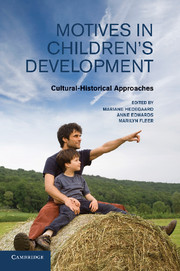Book contents
- Frontmatter
- Contents
- Figures
- Introduction
- Part One Motives, Emotions and Development
- 1 The Dynamic Aspects in Children’s Learning and Development
- 2 The Connection between Motive and Will in the Development of Personality
- 3 Advancing on the Concept of Sense
- 4 Early Stages in Children’s Cultural Development
- Part Two Cultural Practice Motives and Development
- Part Three Creating Conditions for Children’s Engagement
- Index
- References
1 - The Dynamic Aspects in Children’s Learning and Development
from Part One - Motives, Emotions and Development
Published online by Cambridge University Press: 05 November 2011
- Frontmatter
- Contents
- Figures
- Introduction
- Part One Motives, Emotions and Development
- 1 The Dynamic Aspects in Children’s Learning and Development
- 2 The Connection between Motive and Will in the Development of Personality
- 3 Advancing on the Concept of Sense
- 4 Early Stages in Children’s Cultural Development
- Part Two Cultural Practice Motives and Development
- Part Three Creating Conditions for Children’s Engagement
- Index
- References
Summary
Over the years I have pondered about the relation between Jerome Bruner’s study of infants’ intentional orientation to the world and Marx Wartofsky’s philosophical conceptions of human’s dynamic relation to objects, and how to relate this to A. N. Leontiev’s activity theory. Bruner (1972) and his co-workers studied experimentally how infants from one month to seven months of age transform intention-oriented movements into the intentional act of reaching for objects. From this research Bruner proposed that what characterizes humans is that we are born with ‘pre-adaptive structures that make a possible comparison of what is intended in an activity and what is accomplished’ (Bruner 1972, p. 34). Wartofsky in his theory questioned the notion that human perception is ‘natural’ and argued that human perception is an activity that is mediated by artifacts such as tools and language. These mediating artifacts, Wartofsky argued, have to be seen as objectifications of human needs and intentions ‘already invested with cognitive and affective content’ (Wartofsky, 1979, pp. 205–206).
What is special in Bruner’s and Wartofsky’s conceptions of the dynamic between persons and the world is that they do not conceptualize the dynamic of children’s relation to the world starting with the child’s primary needs. Rather, it is a characteristic in humans’ general relation to the world, that can be seen as demands from the world onto the person. The aim in this chapter is to integrate this conception of how demands of being in the world can be related to the cultural-historical approach of children’s development and Leontiev’s theory of motives.
- Type
- Chapter
- Information
- Motives in Children's DevelopmentCultural-Historical Approaches, pp. 9 - 27Publisher: Cambridge University PressPrint publication year: 2011
References
- 7
- Cited by



